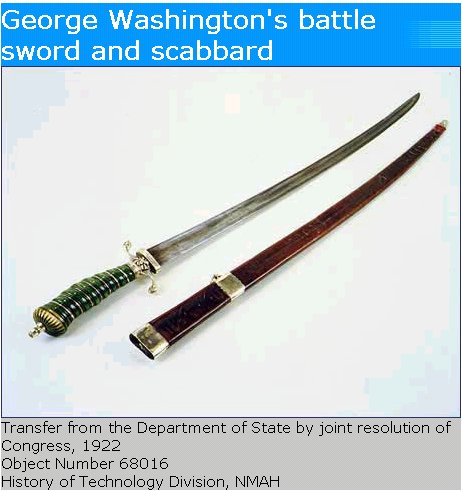| Author |
Message |
|
Henry O.
|
 Posted: Tue 02 Aug, 2016 12:46 pm Post subject: Swords during the American Revolution? Posted: Tue 02 Aug, 2016 12:46 pm Post subject: Swords during the American Revolution? |
 |
|
|
Can anyone point me to some sources or give me a rundown on how to identify the different types of swords in use during the American Revolution? For instance when does a smallsword turn into broadsword or a spadroon, and what's the difference between a saber which has a really deep curve and one which only has a slight curve to it? Were there any major shifts in sword design going on at this time?
|
|
  |
 |
Craig Johnson
Industry Professional

|
 Posted: Tue 02 Aug, 2016 2:18 pm Post subject: Good Book Posted: Tue 02 Aug, 2016 2:18 pm Post subject: Good Book |
 |
|
Check out this book
http://myArmoury.com/books/item.0883940418.html
Good overview with pics of lots of examples and some solid info. It is older but still one of the better sources for the period.
Craig
|
|
    |
 |
|
Jeffrey Faulk
|
 Posted: Wed 03 Aug, 2016 11:07 am Post subject: Posted: Wed 03 Aug, 2016 11:07 am Post subject: |
 |
|
Broadly (and bearing in mind that I am not an expert, others here like Glen Cleeton will be better able to tell you):
By this period (late 1700s) you are looking at swords declining sharply from regular use on the battlefield by anybody but cavalry. The smallsword will have largely transformed into the spadroon, a larger and slightly more robust version, but officers are as likely to carry hangers (light hunting swords) or cavalry sabers. The Scots regiments' officers and noncoms would have carried broadswords, but that's about it as far as those went.
|
|
  |
 |
Roger Hooper

|
 Posted: Wed 03 Aug, 2016 1:02 pm Post subject: Posted: Wed 03 Aug, 2016 1:02 pm Post subject: |
 |
|
Officers also carried cuttoes, which could be called a version of hangers. Here is a photo of George Washington's cuttoe
 Attachment: 47.77 KB Attachment: 47.77 KB

|
|
  |
 |
Glen A Cleeton

|
 Posted: Wed 03 Aug, 2016 2:31 pm Post subject: Posted: Wed 03 Aug, 2016 2:31 pm Post subject: |
 |
|
Neumann's is still a valuable resource , despite some pretty serious nomenclature and attribution issues. It is a great overall of sword types from the late 17th century up past the revolution. Two more very useful books are an also somewhat outdated Harold Peterson American swords and the Medicus Collection book from Flayderman and Mowbray. The Lattimer collection from Hartzler also good to have but he recently published a new works in two volumes. These latter books more of a general reference for American swords from the colonies to the 20th century.
As far as smallswords and spadroons, they were more of a parallel evolution. One will find spadroon type blades in what evolved out of smallsword hilts (kidney type and some boat hilt types) but they most often lack the pas d ane (finger loos) of smallswords. Not all smallswords had three edge blades and not all what could be labeled a spadroon had slim backsword blades.
A good resource for smallswords and hunting swords can be found here.
http://swordlinks.com/courtswords/courtswords.html
Downloadable here
http://www.metmuseum.org/art/metpublications/...ing_swords
Possibly my oldest spadroon like sword would be a 1740ish French hanger with a fairly short 24" blade

What's interesting is that the form continued in one fashion or another with Rose and Starr making similar sidearms for the 1812 war and then Starr making another very spadroon like short hanger with an 1818 model. Mine below, from about 1821.

Fullered straight smallsword like swords continue n the 19th century with Prussian civilian degen and even the American Civil War musician and NCO swords. An assembly of some of my smaller straight swords below. with my revolution period type slotted hllt, likely of the early 1780s. The longer ones there, 32" blades.


Some will go so far as to include a lot of later infantry swords into the spadroon classification but they really are not the same, even if somewhat falling into the same niche. Here are a couple of mine that go beyond spadroons
French Infantry 1860s 34" blade

American market sold by Horstmann 1830s 34" blade.

The British 1796 infantry pattern one of the kidney guards without finger rings. At time, the slimmer broadsword blades get lumped into the spadroon family, as seen with the British 1796 heavy cavalry dress swords with a boat hilt gaurd. American redux of that form with our 1832 officer sword. I list the latter as broadswords, as I do a very small eagle pommel sword I have.
My baby broadsword eagle pommel 1840-1850ish with a 32" blade.

Then finally US militia swords from the 1840s-1850s that became the ubiquitous fraternal swords that although similar to spadroons, I would list as short swords. A couple on our right below post ACW and using musician and nco spadroon blades.
I guess I still call those two spadroons.

My favorite spadroon? I'd be hard pressed but I really like my black ebony example. Simplicity and sharp!

I have a dump of a spadroon file I share online. There are more not spadroons in the folder but mostly spadroons.
https://drive.google.com/folderview?id=0B9AOFMA8y3ODfkNBQkVwbWtNam9WbVI3VnBtYUFWdlFIOGpFaWJfd2pOdk41Q09jOXdyODQ&usp=sharing
My other American Revolution era sword is actually a Swedish 1750ish saber.

Cheers
GC
Also feel free to browse my eagle mania
https://drive.google.com/folderview?id=0B9AOFMA8y3ODRHZJOXJ4dG5tYWs&usp=sharing
And.... a random documents folder, some American Revolution related
https://drive.google.com/folderview?id=0B9AOFMA8y3ODN2hkZzNEOURZY3M&usp=sharing
|
|
  |
 |
|
|

